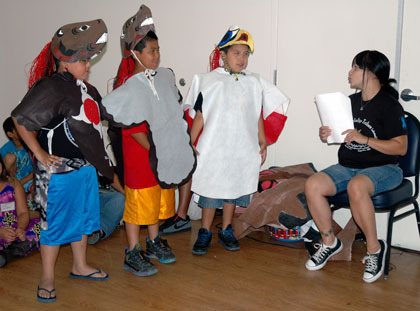TULALIP — At the age of 84, Tulalip Tribal elder Stan Jones Sr. got to see close to 200 Tribal children doing something on Aug. 19 that he was forbidden from doing during his entire childhood — learning the Lushootseed language.
For 15 years, the Tulalip Tribes’ Lushootseed Department has hosted children from ages 5-12 at two-week language camps, teaching them Tulalip history, culture, spirituality and the Lushootseed language, through tools ranging from low- to high-tech.
“When I was young, we would get soap in our mouths for speaking our Indian language,” Jones said. “It wasn’t allowed. We were punished for it. These kids are so lucky to have this opportunity to learn their language and culture. I’ve forgotten a lot of it, but I’m glad we can carry on with it, like we should have been able to do years ago.”
Natosha Gobin has taught the Lushootseed language for 10 years, and explained that each year’s camp revolves around a traditional cultural story that’s used as a bridge to teach the language and local history of the Tribes, through projects ranging from painting and cedar-weaving to making maps of the Tulalip reservation and acting out the stories as plays. This year saw a new wrinkle in educational techniques, as a grant written by Tribal Lushootseed Department Media Director Dave Sienko secured the camp both an antique wood-block proofing press with Lushootseed characters and 25 Nintendo DSi game machines with Lushootseed teaching cartridges.
“We have plans to get 25 more,” Sienko said. “With the proofing press, kids get the tactile experience of moving the letter blocks around. The game cartridges let kids self-test and learn letters, vocabulary and sentence structure, with audio that plays the sounds of the words and pictures they can associate with the terms.”
Sterling Hatch, 7, found his second year of language camp challenging but enjoyable.
“The DSi games are hard but fun,” Hatch said. “I struggled with the singing part, and weaving cedar is pretty hard too. The Indian stories are interesting. I think this helps you to be a better person because you can learn the music and the plays and pass that culture on to others.”
“What I’ve noticed in the kids who have been involved in this camp over the years is that it’s boosted their respect for themselves and others,” Gobin said. “It gives them a sense of identity as they learn who their ancestors were and what sort of lives they led. Life can get too busy and we can lose what’s been passed on to us, but this keeps it alive.”


